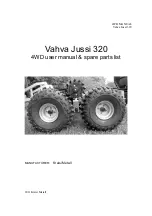
3.
2.4
SAFETY TRAINING
2.5
SAFETY SIGNS
1. Safety is a primary concern in the design and man-
ufacture of our products. Unfortunately, our efforts to
provide safe equipment can be wiped out by a single
careless act of an operator or bystander.
2. In addition to the design and configuration of equipment,
hazard control and accident prevention are dependent
upon the awareness, concern, prudence and proper
training of personnel involved in the operation, transport,
maintenance and storage of this equipment.
It has been said, "The best safety feature is an
informed, careful operator." We
ask you to be that kind of an
operator.
It is the operator's responsibility
to
read and understand ALL
Safety and Operating instructions in the manual and to
follow these. Accidents can be avoided.
4.
Working with unfamiliar equipment can lead to
careless injuries. Read this manual, and the
manual for your auxiliary equipment, before
assembly or operating, to acquaint yourself with
the machines. If this machine is used by any
person other than yourself. It is the machine
owner's responsibility to make certain that the
operator, prior to operating:
a. Reads and understands the operator's
manuals.
b. Is instructed in safe and proper use.
5. Know your controls and how to stop the Ultra- Veyor
System and any other auxiliary equipment quickly in an
emergency. Read this manual and the one provided with
your other equipment.
6. Train all new personnel and review instructions
frequently with existing workers. Be certain only a
properly trained and physically able person will operate
the machinery. A person who has not read and
understood all operating and safety instructions is not
qualified to operate the machine. An untrained operator
exposes himself and bystanders to possible serious
injury or death. If the elderly are assisting with work, their
physical limitations need to be recognized and
accommodated.
1. Keep safety signs clean and legible at all times.
2. Replace safety signs that are missing or have be-
come illegible.
3. Replaced parts that displayed a safety sign should
also display the current sign.
4. Safety signs are available from your authorized
Distributor or Dealer Parts Department or the factory.
How to Install Safety Signs:
•
Be sure that the installation area is clean and dry.
•
Be sure temperature is above 50°F (10°C).
•
Determine exact position before you remove the
backing paper. (See Section 3).
•
Remove the smallest portion of the split backing
paper.
•
Align the sign over the specified area and carefully
press the small portion with the exposed sticky
backing in place.
•
Slowly peel back the remaining paper and carefully
smooth the remaining portion of the sign in place.
•
Small air pockets can be pierced with a pin and
smoothed out using the piece of sign backing paper.
How to Reorder Your Safety Signs
:
1. Call you local dealer, or the factory branch nearest
you.
FACTORY DISTRIBUTION AND SERVICE CENTRES:
Head Office:
RR#5, Guelph, Ontario,N1H 6J2
PHONE (888) 925-4642
FAX (519) 824-5651
938 Glengarry Cres. Fergus, Ontario Canada N1M 2W7
Tel: (519) 787-8227 Fax: (519) 787-8210
70 3rd Ave. N.E. Box 1790 Carman, Manitoba
Canada R0G 0J0
Tel (204) 745-2951 Fax (204) 745-6309
1190 Electric Ave.Wayland, MI.USA 49348
Tel (800) 466-1197 Fax (616) 877-3474
24 Molloy Street Toowoomba, Queensland Australia 4350
Tel 07.4634.7344 Fax 07.4634.7606
Summary of Contents for ULTRA-VEYOR SYSTEM
Page 1: ...ULTRA VEYOR SYSTEM OPERATOR S MANUAL...
Page 2: ......
Page 4: ......
Page 19: ...17 3 SAFETY SIGN LOCATIONS Think SAFETY Work SAFELY B A B B SAFETY DECALS BLOWER B A A...
Page 53: ...51...
Page 55: ......















































